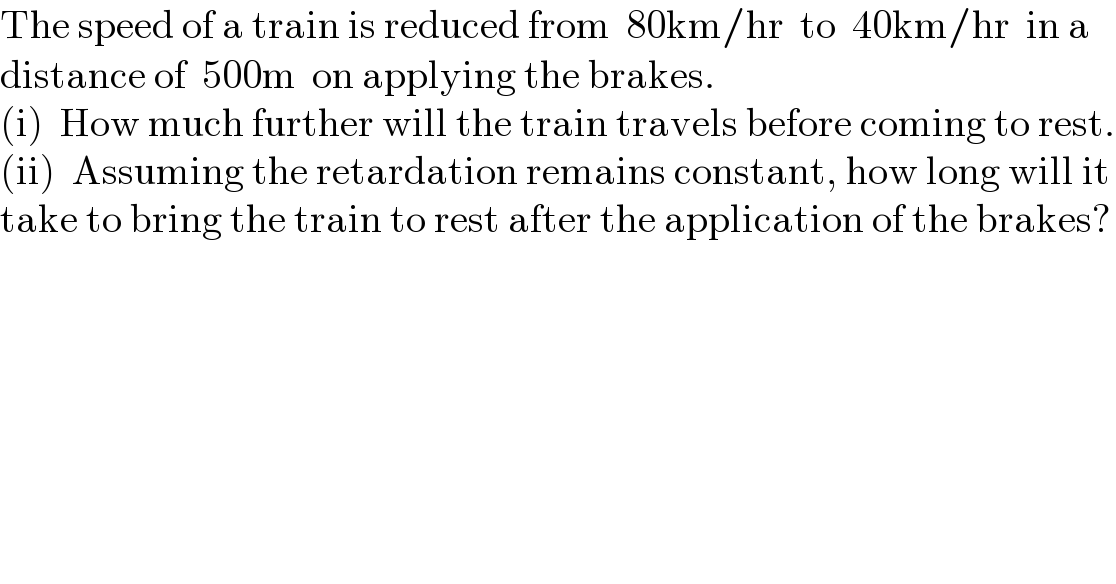Question Number 134530 by I want to learn more last updated on 04/Mar/21

$$\mathrm{The}\:\mathrm{speed}\:\mathrm{of}\:\mathrm{a}\:\mathrm{train}\:\mathrm{is}\:\mathrm{reduced}\:\mathrm{from}\:\:\mathrm{80km}/\mathrm{hr}\:\:\mathrm{to}\:\:\mathrm{40km}/\mathrm{hr}\:\:\mathrm{in}\:\mathrm{a} \\ $$$$\mathrm{distance}\:\mathrm{of}\:\:\mathrm{500m}\:\:\mathrm{on}\:\mathrm{applying}\:\mathrm{the}\:\mathrm{brakes}. \\ $$$$\left(\mathrm{i}\right)\:\:\mathrm{How}\:\mathrm{much}\:\mathrm{further}\:\mathrm{will}\:\mathrm{the}\:\mathrm{train}\:\mathrm{travels}\:\mathrm{before}\:\mathrm{coming}\:\mathrm{to}\:\mathrm{rest}. \\ $$$$\left(\mathrm{ii}\right)\:\:\mathrm{Assuming}\:\mathrm{the}\:\mathrm{retardation}\:\mathrm{remains}\:\mathrm{constant},\:\mathrm{how}\:\mathrm{long}\:\mathrm{will}\:\mathrm{it} \\ $$$$\mathrm{take}\:\mathrm{to}\:\mathrm{bring}\:\mathrm{the}\:\mathrm{train}\:\mathrm{to}\:\mathrm{rest}\:\mathrm{after}\:\mathrm{the}\:\mathrm{application}\:\mathrm{of}\:\mathrm{the}\:\mathrm{brakes}? \\ $$
Answered by mr W last updated on 04/Mar/21

$$\mathrm{80}\:{km}/{h}=\frac{\mathrm{80000}}{\mathrm{60}×\mathrm{60}}=\frac{\mathrm{200}}{\mathrm{9}}\:{m}/{s} \\ $$$$\mathrm{40}\:{km}/{h}=\frac{\mathrm{40000}}{\mathrm{60}×\mathrm{60}}=\frac{\mathrm{100}}{\mathrm{9}}\:{m}/{s} \\ $$$${a}=\frac{{v}_{\mathrm{2}} ^{\mathrm{2}} −{v}_{\mathrm{1}} ^{\mathrm{2}} }{\mathrm{2}{s}}=\frac{\left(\frac{\mathrm{100}}{\mathrm{9}}\right)^{\mathrm{2}} −\left(\frac{\mathrm{200}}{\mathrm{9}}\right)^{\mathrm{2}} }{\mathrm{2}×\mathrm{500}}=−\frac{\mathrm{10}}{\mathrm{27}}\:{m}/{s}^{\mathrm{2}} \\ $$$$\left({i}\right): \\ $$$${s}=\frac{{v}_{\mathrm{2}} ^{\mathrm{2}} −{v}_{\mathrm{1}} ^{\mathrm{2}} }{\mathrm{2}{a}}=\frac{\mathrm{0}−\left(\frac{\mathrm{100}}{\mathrm{9}}\right)^{\mathrm{2}} }{\mathrm{2}×\left(−\frac{\mathrm{10}}{\mathrm{27}}\right)}=\frac{\mathrm{500}}{\mathrm{3}}=\mathrm{166}.\mathrm{7}\:{m} \\ $$$$\left({ii}\right): \\ $$$${t}=\frac{{v}_{\mathrm{2}} −{v}_{\mathrm{1}} }{{a}}=\frac{\mathrm{0}−\frac{\mathrm{200}}{\mathrm{9}}}{−\frac{\mathrm{10}}{\mathrm{27}}}=\mathrm{60}\:{s} \\ $$
Commented by I want to learn more last updated on 04/Mar/21

$$\mathrm{Thanks}\:\mathrm{sir},\:\mathrm{i}\:\mathrm{really}\:\mathrm{appreciate}. \\ $$
Commented by I want to learn more last updated on 07/Mar/21

$$\mathrm{Sir}\:\mathrm{please}\:\mathrm{help}\:\mathrm{me}\:\mathrm{with}\:\:\mathrm{Q134704} \\ $$
Commented by otchereabdullai@gmail.com last updated on 12/Mar/21

$$\mathrm{fantastic} \\ $$
